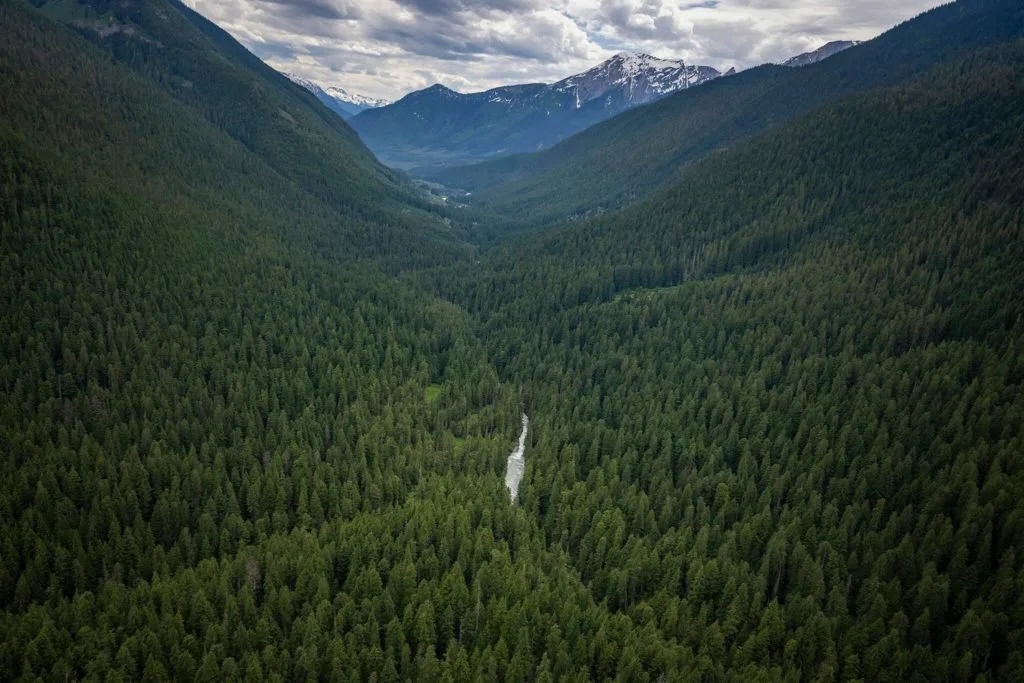Panama has announced the closure of a controversial copper mine after the Supreme Court ruled that a 20-year concession granted to a Canadian firm to operate it was unconstitutional. The decision has been welcomed by environmentalists who said the open-pit mine threatened water supplies. Cobre Panamá is located in a biodiverse jungle area on Panama's Atlantic coast. The government's renewal of its contract with First Quantum Minerals had triggered mass protests.
How Canadian wildfire smoke could impact the Lehigh Valley’s water, crops long term
Weeks after the Lehigh Valley turned sepia toned from Canadian wildfire smoke, the skies have cleared and there’s even been some rain, even though it hasn’t been enough to push much of the state out of moderate drought status. While environmentalists and researchers said impacts on the region’s crops and water may be few due to the short duration of smoky days, it’s a largely understudied topic. However, as climate change worsens and the chance for more wildfires increases, experts said the impacts could similarly escalate.
Paper can't be a solution to plastic waste': Canadian environmentalists warn about the rise in single-use paper products
The prohibition of single-use plastic products is crucial to Canada's plan of achieving zero plastic waste by 2030, but with the ban, environmentalists are growing increasingly concerned about the amount of paper packaging being used in its place. "We absolutely need to shift away from using plastics as much as we do, but trading in plastic pollution for deforestation and forest degradation is not the answer," Canopy founder and executive director Nicole Rycroft told CTV News. "We really need to make sure we do not create another environmental disaster."
Sitting on a carbon bomb
After decades of seeing their lands sold off by the province and exploited by resource companies, Blueberry River First Nations won a landmark case in 2021. A B.C. Supreme Court judge ruled the province had breached the nation’s treaty rights by allowing so much disturbance it was impossible for the community to maintain its way of life. That ruling led to an agreement with the province in January that gives Blueberry River the power to determine where and how new development proceeds. The implications go far beyond Treaty 8 territory. The nation sits on what researchers call a “carbon bomb” — that, if fully tapped, would become Canada’s largest source of greenhouse gasses and among the largest in the world.
1 down, 168 to go: Environmentalists call for province to protect 30% of land by 2030
Environmentalists are praising the creation of a new conservancy area near Revelstoke, but the provincial government needs to create 168 like it to meet its own protection goals by 2030. Both Premier David Eby and Environment Minister George Hyman said during last month’s announcement of a new conservancy in the Incomappleux Valley that the province wants to protect 30 per cent of its land base by 2030.
flood, Peguis First Nation, flood mitigation efforts, condemned homes, mould, Manitoba, First Nation, flood-prone, forcibly surrendered, basin, dike work, worst-case future scenarios
Environmentalists are raising concerns about the future of Nova Scotia's only operating gold mine. Gold from the open pit at the Touquoy mine in Moose River, N.S., has already been exhausted, so active mining stopped at the end of January. The mine's owners, Australian company St Barbara, say they are now turning their attention to processing stockpiles, which are lower grade ore and less profitable.
CANADA: Canadian golf courses working to reduce ecological impact
Golf's origins date back hundreds of years to rural Scotland where the natural features of the land near Edinburgh created the hazards that golfers had to play around and sheep kept the grass well manicured. But the game has spread around the world in the ensuing centuries with different environments forcing the technology used to maintain golf courses to evolve well past sheep. Golf courses have become divisive with some environmentalists criticizing their use of pesticides and fresh water, but their defenders argue that they can be oases that give cities and suburbs important green space.
First Nations, environmentalists tired of government stonewalling over selenium probe
First Nations and environmentalists say they are angry the federal and British Columbia governments continue to stonewall American requests for a joint investigation of cross-border contamination from coal mining as meetings of the panel that mediates such issues wrap up. "They can sit on every fence they want, but at the end of the day, we're going to do what's right," said Heidi Gravelle, chief of the Tobacco Plains First Nation, one of several bands upset over selenium contamination in southeastern B.C.'s Elk Valley from coal mines.
Battle lines drawn on potential New Brunswick gas export terminal
With political momentum building for a liquefied natural gas export terminal in Atlantic Canada, a new coalition of environmentalists is calling on Ottawa to hit the brakes. The new group Stop the Gas includes veterans of the battle over shale gas development in New Brunswick a decade ago. Jim Emberger of the New Brunswick Anti-Shale Gas Alliance says the new push for LNG exports is about governments and gas companies trying to wring maximum profits out of an energy source destined to decline because of tougher climate change policies.
Will Canada's single-use plastics ban actually make a difference?
Canada has officially banned single-use plastics, specifically plastic bags, straws, cutlery, stir sticks, six-pack rings and some takeout containers. Manufacturers have until the end of 2022 to stop manufacturing them, and until the end of 2023 to stop selling them. Environmentalists are hoping Canada’s ban will pave the way for other countries to follow their lead. France has also prioritized plastic pollution by banning plastic packaging on fruits and vegetables. Add to that the world’s first Global Plastic Pollution Treaty, signed in March, and maybe there is reason to hope we are making progress!
With election on horizon, Legault government commits to increasing royalties on water
The Quebec government is moving toward increasing the amount it charges commercial water users, in what amounts to an early campaign promise months before the next election. Environment Minister Benoit Charette is expected to table a proposed law this week that would raise the royalties charged to commercial water users. There are few details about the coming legislation, which was first reported Monday by La Presse and later confirmed by Radio-Canada.
Line 5 pipeline between U.S. and Canada could cause 'devastating damage' to Great Lakes, say environmentalists
An aging pipeline that carries oil along the bottom of the ecologically sensitive and turbulent Straits of Mackinac, where Lake Michigan and Lake Huron meet, is in such a state of disrepair it could burst at any moment and cause catastrophic damage to the Great Lakes, environmentalists warn. Line 5, a 1,000-kilometre-long pipeline owned by Calgary-based Enbridge, carries up to 540,000 barrels of oil and natural gas liquids a day from Wisconsin to Sarnia, Ont., where it is shipped to other refineries in Ontario and Quebec.
Letter: Time to address water quality in Quamichan Lake
Rowing Canada’s continued use of Quamichan Lake for training winning Olympians is a golden opportunity to address the obscene multi-source pollution that is killing our lake. North Cowichan councillors could win gold medals among environmentalists if they act now to save our over-studied lake. Councillors must urgently work with Victoria and Ottawa to declare Quamichan Lake an eco-zone.
Well water fears prompt calls to halt proposed bottling plant near B.C. village
Angie Kane knows how important well water is when you live in the heart of dry, rural B.C. For 17 years, she lived on a ranch outside Clinton, a semi-desert village about 120 kilometres northwest of Kamloops. Many residents who live outside municipal boundaries draw water from aquifers. For Kane, the arid climate always kept the importance of her water supply top of mind. "That is the biggest concern, for anyone who has a well, is will it dry up? Or will it go away?" she told CBC News.
Canadian Country Music Star Corb Lund Is Taking a Stand Against Fossil Fuels
With hits like the "Roughest Neck Around" that celebrate oil workers, Canadian country rocker Corb Lund might not be an obvious choice as a campaigner against fossil fuel expansion. But the music star has taken on an unexpected new role, as a leader of efforts to stop new open-pit coal mines in western Canada's iconic Rocky Mountains. Alberta’s province, dubbed "Canada's Texas" by political scientists for its petroleum industry and conservative political culture, has been hit by the cancellation of the planned Keystone XL pipeline to the United States, as US President Joe Biden's administration steps up action on climate change.
Under pressure, company cancels Tennessee pipeline
Environmentalists and activists claimed victory recently after a company cancelled plans to build an oil pipeline through southwest Tennessee and north Mississippi, and over an aquifer that provides drinking water to one million people. Byhalia Connection said it will no longer pursue plans to build a 79-kilometre underground artery that would have linked two major U.S. oil pipelines while running through wetlands and under poor, predominantly Black neighbourhoods in south Memphis.
Critics, environmentalists dump on Scheer’s raw sewage bill
A recently proposed private member’s bill that would make it a criminal offence to dump raw sewage in waters frequented by fish was dismissed as a step backwards by environmentalists and opposing MPs. Bill C-269, proposing changes to the Fisheries Act, was tabled by former leader of the Conservative Party of Canada Andrew Scheer, and underwent second reading May 10. The proposed changes would basically be a return to the laws under the old Fisheries Act, which were ineffective and rarely enforced, said Mark Mattson, environmental lawyer and president of Swim Drink Fish Canada.
Canadian officials find PFAS traces in water from Memphremagog
Canadian officials have found traces of the emergent pollutant class PFAS in a drinking water intake area connected to Lake Memphremagog. The chemicals, found in water meant for the city of Sherbrooke by Quebec’s environmental ministry last fall, have spurred concern from environmentalists on both sides of the border. The findings add to years-long talks about the border-spanning lake, which flows north and supplies drinking water for more than 175,000 Canadians.
How liquid salt could be the answer to oilsands tailings ponds
Wastewater from oilsands mining operations have long been a challenge for Canada's energy industry, much of it ending up in industrial tailings ponds. But scientists and engineers at the University of Calgary are taking aim at eliminating watery tailings from the oilsands production process with the help of specialized liquid salt. Hot water is used in oilsands mining operations to extract the oily bitumen from the sand, with the resulting wastewater ending up in tailings ponds to settle and later be reused. Alberta has an estimated 1.3 trillion litres of fluid tailings sitting in tailings ponds.
Canada’s Indigenous pipe dream might end Trudeau’s Trans Mountain nightmare
An Indigenous-led group plans to offer to buy a majority stake in the Trans Mountain oil pipeline from the Canadian government this week or next, a deal that could help Prime Minister Justin Trudeau mitigate election-year criticism from environmentalists. The group, called Project Reconciliation, aims to submit the $6.9 billion offer as early as Friday, managing director Stephen Mason told Reuters, and start negotiations with Ottawa two weeks later. Project Reconciliation said the investment will alleviate First Nations poverty, a watershed for Indigenous people who have historically watched Canada’s resources enrich others.





















